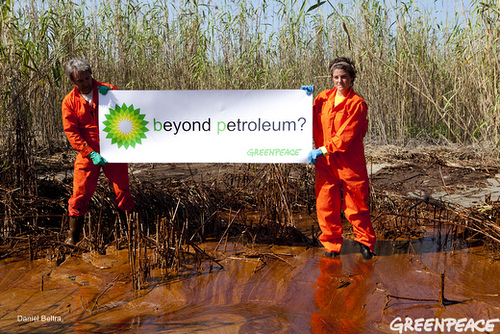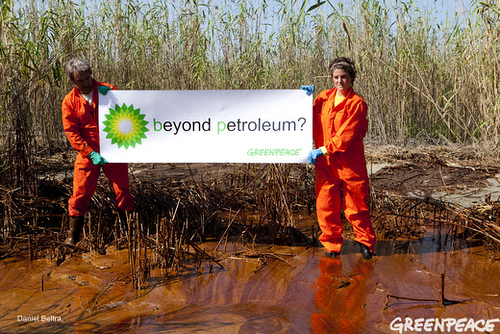 Trudging through sludge along the Louisiana coast.Photo: Daniel Beltra/Greenpeace USAWith Attorney General Eric Holder now huddling with Gulf states attorneys general, the uneasy relationship between BP and the Obama administration is taking the ugly but inevitable “see you in court” turn. The White House is so anxious to separate itself from the BP stink that from now on only Coast Guard Adm. Thad Allen will do daily briefings on the spill, with no BP exec in sight.
Trudging through sludge along the Louisiana coast.Photo: Daniel Beltra/Greenpeace USAWith Attorney General Eric Holder now huddling with Gulf states attorneys general, the uneasy relationship between BP and the Obama administration is taking the ugly but inevitable “see you in court” turn. The White House is so anxious to separate itself from the BP stink that from now on only Coast Guard Adm. Thad Allen will do daily briefings on the spill, with no BP exec in sight.
And yet, as The Washington Post‘s Joel Achenbach and Jerry Markon point out, this creates quite the awkward situation. Obama desperately needs BP to succeed. His status as a leader erodes with each day of gushing-oil webcasts from the sea bottom.
The opening of a criminal investigation or civil action against BP, if either were to happen, would create the unusual situation of the federal government weighing charges against a company that it is simultaneously depending on for the most critical elements of the response to the record oil spill.
The powers that used to be: David Brooks, writing in The New York Times, suggests that while this may not be Obama’s Katrina, it could be his Iranian hostage crisis, where every passing day without a resolution sharpens the perception that the president is powerless and the federal government inept.
The plume taps into a series of deep anxieties. First, it taps into the anxiety that the people running our major institutions are just not that competent. Second, it feeds into the anxiety that there has been an unhappy marriage between corporations and government officials, which has had the effect of corrupting both. Most important, the plume exposes the country’s core confusion about the role of government.
Storm … uh, scrub the beaches!: One way to counter the notion of federal impotence is to call out the military, argues David Gergen. The generals should take over the cleanup. It can only help, Gergen notes, to cut BP out of the picture entirely — except for signing checks, of course.
First off, who can now trust BP to do the job right? From the beginning, it has appeared to be more interested in shoring up its stock price than in playing straight and solving the problem. It took reckless short cuts in opening up the rig, had no serious plan in place for a disaster, low-balled early estimates of the spill, has high-balled its chances of stopping the leak and has kept both the government and the public too much in the dark.
That’s crazy talk: The latest example of BP’s altered reality is CEO Tony Hayward’s questioning of reports of massive underwater oil plumes. Hayward insists BP has no evidence of these monster clouds of gunk. Any oil under water, he says, ultimately will float to the surface. Scientists aren’t buying it. They worry that what we can’t see is an ecosystem collapsing, reports the Associated Press.
Many … species are now in their annual spawning seasons. Eggs exposed to oil would quickly perish. Those that survived to hatch could starve if the plankton at the base of the food chain suffer. Larger fish are more resilient, but not immune to the toxic effects of oil.
Dead in the water: If the hole isn’t plugged soon, expect BP and the feds to ratchet up the use of dispersants. The Wall Street Journal reports that a group of scientists called together by the feds will recommend spraying more of the chemicals over the summer to reduce the amount of oil making it to Gulf marshes and beaches — but they’ll do so knowing they might be destroying a deep, dark world we can only imagine.
[S]cientists say they can’t make firm predictions about the effects of chronic exposure, in part because dispersants have rarely been used for long periods of time. In addition, funding for research on dispersants has lagged in recent years as concern about oil spills slipped off the political agenda.
So it goes in the Summer of Sludge.



